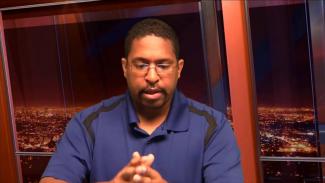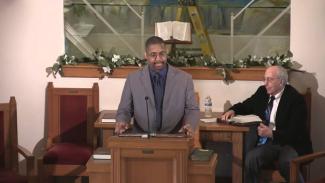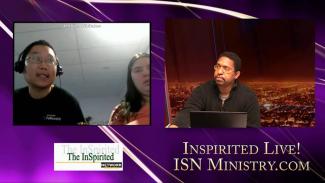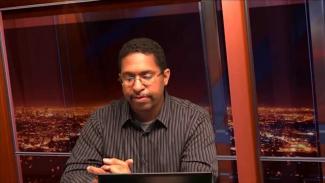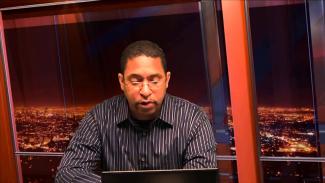This week we are joined by Dr. May-Ellen Colon and Dr. Gaspar Colon as we discuss Jesus on the topic of community outreach. What did Jesus have to say about community outreach? How did Jesus view the church's role in terms of reaching out to those in spiritual darkness? Who is our neighbor? What did He mean by the metaphors of light and salt? What roles do different members within the church play in reaching outsiders? How does the farming analogy illustrate these different roles? How do we prepare the soil, sow the seed, nurture the crop, and reap the harvest?
Topic: Sharing Faith
To see more broadcasts select show names, a year, or all video media.John Spellman preaches at the Babylon SDA Church. The writers of the Bible testify that its origins begin with the Holy Spirit who spoke and move upon men. The Testimony of Jesus warns us of things to come. The mind of Christ is certainly needed today. Are you prepared to stand for your faith against opposition and impossible odds? What if standing for the truth meant being unpopular? What if it meant being ridiculed?
What challenges and obstacles did the Early Church face? How did Jesus redirect his disciples to his true purpose while they still held on to their pre-conceived ideas and biases? What exactly is the good news of the gospel and in what way were Jesus' followers witnesses? How did the Great Controversy play out in the early church? In what ways did Satan attack the church from within and without? What can we learn from the Early Church that could help us with our challenges today?
What was the mission and message of Paul all about? What could we say was central to his message? What did Paul preach? How did he adapt his message to reach different kinds of audiences? How important was the concept of the resurrection in Paul's teaching? In this lesson we will explore the techniques Paul used to reach Jewish and Gentile audiences. Like Jesus, Paul used what was familiar to his listeners to explain what was unfamiliar to them. In looking at how Paul did this, we can learn a great deal about teaching spiritual truths to people today.
What do we know about Paul before his call on the road to Damascus? What kind of person was he? What can we learn about God's willingness to save the worst sinners from the story of Saul's conversion to the Apostle Paul? How did the early Christians at first respond to Paul's conversion story? Are we any different today with people who have Paul's background? There is much we can learn from Paul's story as we seek to make disciples of men today. Paul's story is a story of hope for the undeserving and those who have a dark past in which they have made the most terrible mistakes.
This week we discuss Philip the evangelist. But is this Philip different from other Philips in the Bible? How can we know for sure? What can we learn about mission work from what the Bible says about this Philip? Why was Philip chosen to serve as a deacon? What qualities did he have that made him stand out? What events later lead to his success as an evangelist? What can we learn from this as Christians today? What does the prophetic ministry of Philip's daughters say about Philip? What might this mean for those called to ministry today?
What can we learn from Peter's outreach to the gentiles? How did it contrast from Paul's? What can we learn from the story of Cornelius and the conversion of his friends and family? What important lessons did Jews of the early church have to learn? What might that mean for the church today? Does culture or race matter when it comes to salvation? This week as we explore these lessons we'll look at the stories of early gentile converts to Christianity.
Is the church really supposed to reach out to people of different backgrounds, cultures, ethnicity, and races? Is God a respecter of persons? Is salvation exclusive based on demographics of a person’s birth? Was it always God’s plan to reach non-Jews? How did Jesus relate to non-Jews? Why did He focus primarily on a Jewish audience? What do his interactions with gentiles teach us about reaching people of different backgrounds? What are the implications for the church today?
Has the plan of salvation always been all inclusive? Was it always God’s plan to save the entire world, or only a select group of people? What can we learn about the plan of salvation from the Old Testament? What was the purpose of the Nation of Israel? How did Jesus fulfill the prophecies of the Old Testament? What does the Great Commission reveal about the role of the Christian church and Christianity in Jesus’ mission to save the lost? What can we learn from the parables of Jesus about how Jesus viewed salvation and the role the church should play in it?
How does God use people to witness in unlikely circumstances? How did God use the exiles to introduce Himself to great kings and leaders of empires? What were the qualities of Daniel, Joseph, and Esther that made them powerful witnesses for God while under the rule of those who did not share their faith? Does God use active or passive witnesses? Should one's witness be a formal Bible study series or scattered over time? What can we learn from these examples about sharing our faith and doing evangelism?
What can we learn about missionary activity from the story of Jonah? What kind of missionary was Jonah and how did he respond to his calling? Do missionaries have flaws? What does God's pursuit of Jonah tell us about salvation and who God desires to save? Why was Jonah reluctant to go to Nineveh? In what ways are we very similar in attitude to Jonah? This week we explore the story of Jonah from a missionary standpoint and learn how God shows compassion on the repentant and how His judgments are conditional.

